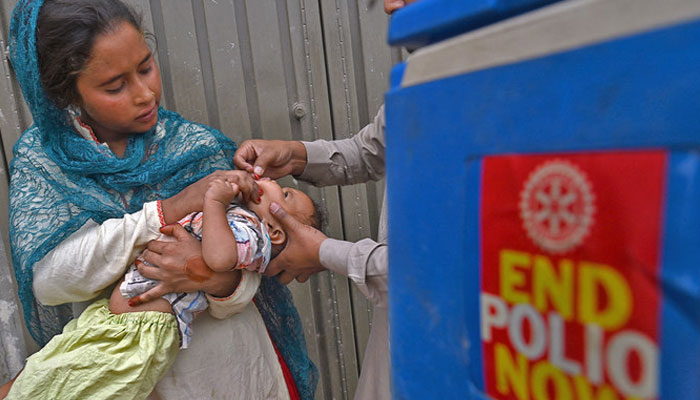Polio clawback
Even more alarmingly, one of latest recorded cases comes from Chakwal district of Punjab
Pakistan’s fight against polio is in serious trouble. There are still four months left until the end of 2024 but the country has already more than doubled its case count from last year. Even more alarmingly, one of the latest recorded cases comes from the Chakwal district of Punjab, the only province not to register a single poliovirus case since 2020. This year’s case count has now reached 14, with 11 cases from Balochistan, two from Sindh and one from Punjab. According to one health official, the only good news on the polio front now “is that not a single case of polio has been reported from Khyber Pakhtunkhwa, Islamabad, Gilgit-Baltistan, and Azad Jammu and Kashmir”. That being said, there is still plenty of time left for this year’s case count to increase and this seems highly likely since polio is now regaining ground in Pakistan and the state appears to be on the back foot. How have things reached such an abysmal state? Reports from June on this year’s polio resurgence claimed that parental refusal of the vaccine has reached a record-high, with official sources claiming that thousands of parents across Pakistan refused to get their children vaccinated during the last vaccination campaign. There was subsequently a large polio vaccination drive from July 1 to July 7, covering 9.5 million children across 41 districts. And yet, the virus has gained ground.
Taking note of the alarming rise in polio cases, the PM chaired a crucial meeting to review the progress and challenges of the ongoing polio eradication efforts across all provinces last Friday (August 9). The meeting included the PM’s focal person on polio, the Sindh governor and chief minister, all chief secretaries, IGPs, and senior representatives from major NGOs like Unicef and the WHO. Bill Gates also joined the meeting virtually. The PM emphasized the need for a renewed nationwide polio eradication effort. Gates, for his part, praised the July polio campaign for reaching every child and said “sustaining this hard work over the next few months can help in halting poliovirus transmission in the country”. Indeed, Pakistan will need more campaigns that reach every child to get off the list of polio endemic nations, a list where it has only Afghanistan for company.
This will require overcoming the formidable vaccine hesitancy and misinformation problem on a sustained basis, something that appears to have eluded our health authorities thus far. Parents must be made to realize in no uncertain terms what rejecting the polio vaccine could lead to, and all misconceptions about the vaccine need to be dispelled. The latter will require not only cracking down on anti-vaccine misinformation and propaganda but also enlisting the support of local community and religious leaders and others who the people tend to listen to. Then there is also a great need for functions like health, which encompasses the polio battle, to remain in good working order regardless of political comings and goings. It must be noted that Pakistan saw an even more significant polio surge during the PTI government’s time in power, with the case total crossing the 100 mark during 2019. Key institutions are seemingly still too sensitive to who happens to be in power and appear to require greater independence. This country will, it is hoped, remain a democracy in the years to come and governments will come and go. Some will be better than others. This does not mean key goals like eradicating polio end up being compromised.
-
 Caleb McLaughlin Shares His Resume For This Major Role
Caleb McLaughlin Shares His Resume For This Major Role -
 King Charles Carries With ‘dignity’ As Andrew Lets Down
King Charles Carries With ‘dignity’ As Andrew Lets Down -
 Brooklyn Beckham Covers Up More Tattoos Linked To His Family Amid Rift
Brooklyn Beckham Covers Up More Tattoos Linked To His Family Amid Rift -
 Shamed Andrew Agreed To ‘go Quietly’ If King Protects Daughters
Shamed Andrew Agreed To ‘go Quietly’ If King Protects Daughters -
 Candace Cameron Bure Says She’s Supporting Lori Loughlin After Separation From Mossimo Giannulli
Candace Cameron Bure Says She’s Supporting Lori Loughlin After Separation From Mossimo Giannulli -
 Princess Beatrice, Eugenie Are ‘not Innocent’ In Epstein Drama
Princess Beatrice, Eugenie Are ‘not Innocent’ In Epstein Drama -
 Reese Witherspoon Goes 'boss' Mode On 'Legally Blonde' Prequel
Reese Witherspoon Goes 'boss' Mode On 'Legally Blonde' Prequel -
 Chris Hemsworth And Elsa Pataky Open Up About Raising Their Three Children In Australia
Chris Hemsworth And Elsa Pataky Open Up About Raising Their Three Children In Australia -
 Record Set Straight On King Charles’ Reason For Financially Supporting Andrew And Not Harry
Record Set Straight On King Charles’ Reason For Financially Supporting Andrew And Not Harry -
 Michael Douglas Breaks Silence On Jack Nicholson's Constant Teasing
Michael Douglas Breaks Silence On Jack Nicholson's Constant Teasing -
 How Prince Edward Was ‘bullied’ By Brother Andrew Mountbatten Windsor
How Prince Edward Was ‘bullied’ By Brother Andrew Mountbatten Windsor -
 'Kryptonite' Singer Brad Arnold Loses Battle With Cancer
'Kryptonite' Singer Brad Arnold Loses Battle With Cancer -
 Gabourey Sidibe Gets Candid About Balancing Motherhood And Career
Gabourey Sidibe Gets Candid About Balancing Motherhood And Career -
 Katherine Schwarzenegger Shares Sweet Detail From Early Romance Days With Chris Pratt
Katherine Schwarzenegger Shares Sweet Detail From Early Romance Days With Chris Pratt -
 Jennifer Hudson Gets Candid About Kelly Clarkson Calling It Day From Her Show
Jennifer Hudson Gets Candid About Kelly Clarkson Calling It Day From Her Show -
 Princess Diana, Sarah Ferguson Intense Rivalry Laid Bare
Princess Diana, Sarah Ferguson Intense Rivalry Laid Bare




